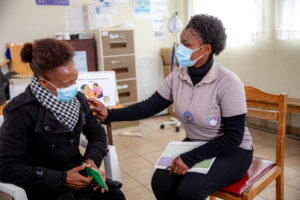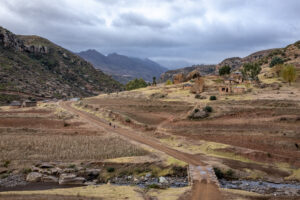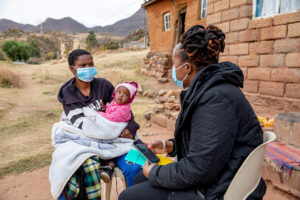How Mentor Mothers Leave No Women and Girls Behind This International Women’s Day, and Every Day.

Makeletso and her client in a clinic in Lesotho.
“We can’t do anything about the rain and flooded rivers in Lesotho. But we can promise that mothers2mothers Mentor Mothers, like me, will be the bridge to the healthy life, full of potential, that the women and girls in our communities so desperately need and deserve” – Makeletso Khomonngoe, mothers2mothers HIV Testing Services Mentor in Lesotho.
Today is International Women’s Day, and we are joining the United Nations in celebrating the power that technology and digital education have in advancing gender equity. While not a silver bullet, our experience at mothers2mothers (m2m) has shown us that, when digital health innovations are in the hands of female community health workers, and thoughtfully layered with in-person services, they have the power to be truly transformative for women & their communities—because when women lead, communities get what they need.
Leave No Women and Girls Behind This International Women’s Day, and every day
With more than half of the people living across the African continent—around 615 million people—unable to access to the health care they need, the work of community health workers like m2m Mentor Mothers is more critical than ever. Women like Makeletso, who is working to change this reality for the women and girls in her community in Lesotho.

Flooding prone road in rural Lesotho.
Makeletso loves her country, but it is not without its many challenges: “In my beautiful, mountainous country of Lesotho, it can rain for days, and sometimes repeatedly over seven months, causing the muddy roads to cut off communities from their nearest clinics.”
Women have to travel far in these conditions to access care—taking them away from their families and household responsibilities—and the cost of transport can be a heavy burden. As a result, girls, women and their families, are cut off from their nearest health centre, making it difficult, if not impossible, to access treatment and vital health services. This can be profoundly dangerous, particularly during pregnancy, or when treating and managing HIV, and other related health issues like diabetes and hypertension.
Why is this a gender rights issue?
Because girls and young women in sub-Saharan Africa between the ages of 15–24 are three times as likely to be living with HIV than young men, and a staggering 70% of women who die during pregnancy and childbirth globally are located in the region.
Come rain or shine, Makeletso and her fellow m2m Community Mentor Mothers and Nurses literally go the extra mile—travelling to these remote communities to reach women and girls where they are and provide them with vital and life-saving integrated primary health care.
But, what happens when it is not possible to meet, or when follow-up is needed between visits?
That’s where digital health tools come into play: Makeletso is able to strengthen the bridge to care by tracking her clients’ progress through apps, providing services tailored to their needs and following up by phone, and connecting her clients to additional information and support through a WhatsApp Chatbot.

m2m Mentor Mother with a client and her daughter outside their home in Lesotho.
Digital tools like these cannot replace the invaluable connection forged through the empathetic care that Mentor Mothers deliver in person, but they can help women access health services as and when they need it and at their convenience. Critically, they are also a vital part of delivering universal health coverage and achieving Health for All by 2030, helping community health workers, like Makeletso, take health care to that last mile.

Rainbow after rain in Lesotho
“I can see in my own work that combining our digital health tools with our in-person services and the strong bonds we have with our clients has truly helped women and girls access, start, and stay in care. As a mother myself, I know all too well the health challenges in our community, and I am proud to play my part in ensuring no one is left behind,” adds Makeletso.
This International Women’s Day, find out more about how m2m is evolving and expanding our range of integrated health services so that Makeletso and her fellow Mentor Mothers can make sure no woman or girl is left behind.






















